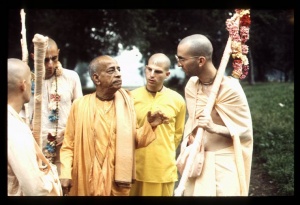CC Madhya 2.9 (1975)

A.C. Bhaktivedanta Swami Prabhupada
Below is the 1996 edition text, ready to be substituted with the 1975 one using the compile form.
TEXT 9
- caṭaka parvata dekhi’ ‘govardhana’ bhrame
- dhāñā cale ārta-nāda kariyā krandane
SYNONYMS
caṭaka parvata—the sand dunes; dekhi’—seeing; govardhana—Govardhana Hill in Vṛndāvana; bhrame—mistakes; dhāñā—running; cale—goes; ārta-nāda—wail; kariyā—making; krandane—cries.
TRANSLATION
Śrī Caitanya Mahāprabhu would also run very fast across the sand dunes, mistaking them for Govardhana. As He ran, He would wail and cry loudly.
PURPORT
Because of the winds of the sea, sometimes the sand would form dunes. Such sand dunes are called caṭaka parvata. Instead of seeing these sand dunes simply as hills of sand, the Lord would take them to be Govardhana Hill. Sometimes He would run toward these dunes at high speed, crying very loudly, expressing the state of mind exhibited by Rādhārāṇī. Thus Caitanya Mahāprabhu was absorbed in thoughts of Kṛṣṇa and His pastimes. His state of mind brought Him the atmosphere of Vṛndāvana and Govardhana Hill, and thus He enjoyed the transcendental bliss of separation and meeting.